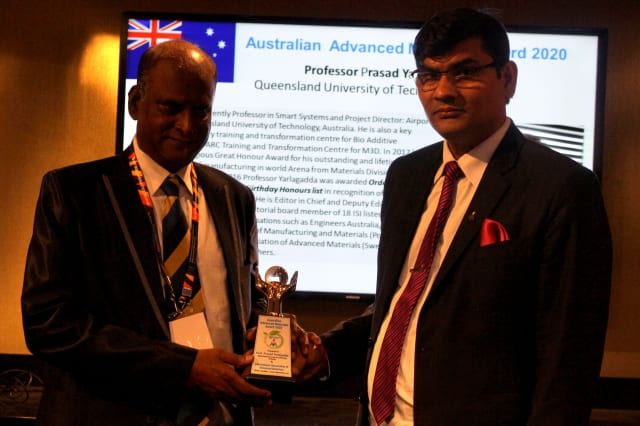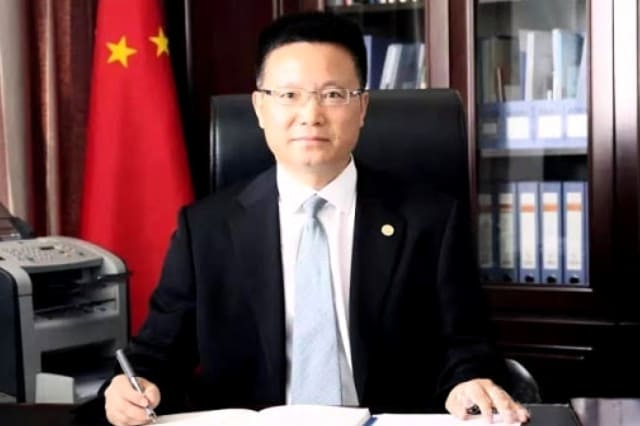.jpg)
Australian Advanced Materials Award 2020

Prof. Prasad KDV Yarlagadda
Queensland University of Technology, Australia
Prof. Prasad KDV Yarlagadda has worked in the industry and academia for over 35 years. He is a distinguished graduate of IIT Bombay and brought considerable Bio manufacturing skills to Australia based on his prior experience in India, Hong Kong, Paua New Guinea, and Singapore. He currently serves as a Professor of Smart Systems and Project Director: Airports of the Future, in Queensland University of Technology, Australia. He is also a key researcher in Industry training and transformation centre for Bio Additive Manufacturing and ARC Training and Transformation Centre for M3D.
Prof. Yarlagadda has had a number of distinguished appointments in various universities in India, China, and Australia. Over his prolific career, he has received more than $16M funding for his research and has published over 500 papers. In 2012, he received a Prestigious Great Honour Award for his outstanding and life time contribution to the discipline of manufacturing in world Arena from Materials Division of Polish Academy of Sciences. In 2016, Professor Yarlagadda was awarded Order of Australia Medal and included in Queens Birthday Honours list in recognition of his outstanding service to Engineering Profession and Indian Community in Queensland, Australia. In recognition of his expertise in manufacturing of medical devices, Department of Science and Technology, Government of India appointed him as a VAJRA Professor during 2018 and 2020.
He is the Editor in Chief and Deputy Editor-in-chief of 4 international journals and also serves as an editorial board member of 18 ISI listed Journals. He is a fellow of many professional organisations such as Engineers Australia, Institution of Engineers (India), World Academy of Manufacturing and Materials (Poland), and more recently Fellow of International Institute of Advanced Materials (Sweden), Society of Manufacturing Engineers among others. He has also held a number of offices in both professional organisations and community organisations including the post of President, Society of Manufacturing Engineers, President of Federation of Indian communities of Queensland, Chair Person, GOPIO International Science & Technology Council, President of The India Australia society, Vice-President of Vedanta centres of Australia, and several others.

Prof. Qingyuan Wang
Chengdu University, China
Prof. Qingyuan Wang is a full Professor of Sichuan University since 2001. He is currently the president of Chengdu University. He received his PhD in 1998 from Ecole Centrale Paris, France, followed by postdoctoral experience from 1999 to 2003 in Faculty of Engineering of Purdue University, and JSPS fellow at Kagoshima University, Japan. He served as a visiting professor at Univ Paris Sud, Clausthal TU, and Honorary Professor at Univ Liverpool, Univ New Hampshire, RMIT.
His research activity is focused on Materials Science & Solid Mechanics, Very High Cycle Fatigue (VHCF), Green Constructional Material, Mechanical Behavior of Structural Materials and Structures, and Composite Repairs of damaged Structures.
He has served as co-chief editor for Chinese Journal of Experimental Mechanics, editorial Committee member for Fatigue Fracture Eng Mater Structures, etc. He also served as the chairman of organizing committee for VHCF6-2014. Prof. Wang has published over 200 papers in SCI index journals in the areas of Mechanics, Materials, and Structures. He is one of the Most Cited Chinese Researchers (Elsevier 2014, 2015, 2016, 2017, 2018).
He is the recipient of many prestigious fellowships and awards including Sina-French fellowship, JSPS Fellow, Excellent Scientist for “100 Talents Program” of Chinese Academy of Sciences, TAML Best paper award, IAAM lecture award, National Distinguished Young Scholars, First class Natural Science Research Award of National Ministry of Education(2006), First class Science &Technology Research Award of Sichuan Province(2014), National Natural Science Award of Research of Chinese central government(2018), etc.